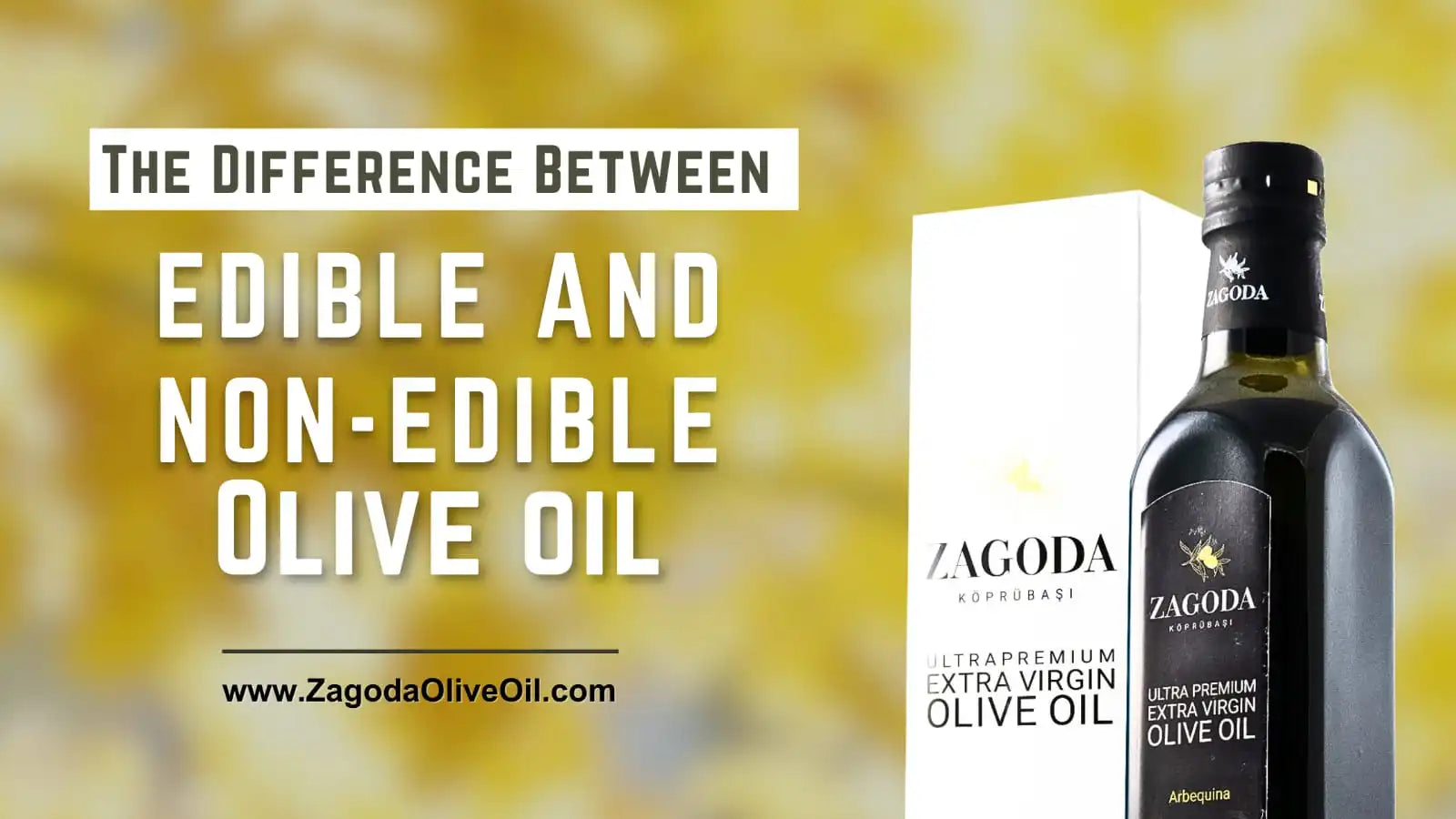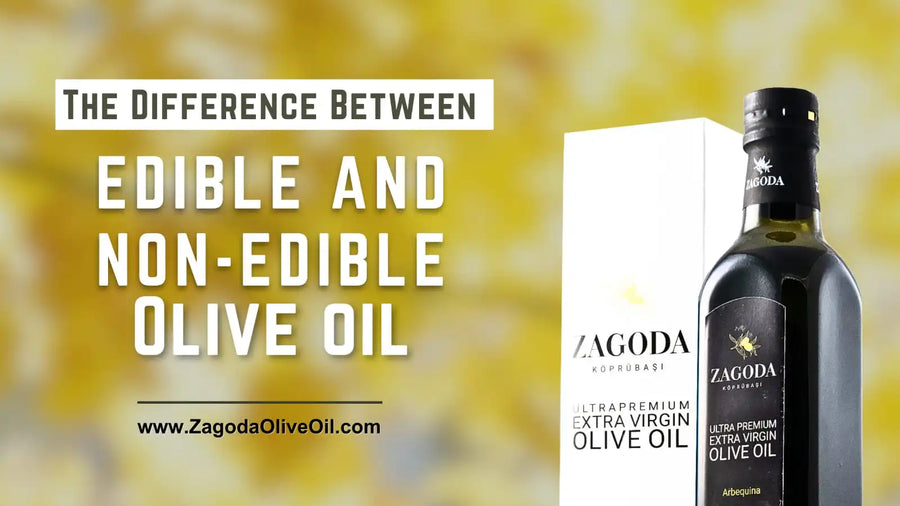In this article, we will delve into the world of olive oil and explore the differences between edible and non-edible olive oil. Olive oil has long been praised for its health benefits and culinary uses. But did you know that olive oil can also be utilized in various non-edible applications, such as beauty and skincare?
In this article, we will delve into the world of olive oil and explore the differences between edible and non-edible olive oil. We will also uncover the many uses and benefits of both types, shedding light on the versatility of this golden elixir.
Understanding the Difference Between Edible and Non-Edible Olive Oil
Firstly, let's clarify the difference between edible and non-edible olive oil. Edible olive oil, as the name suggests, is safe for consumption and is commonly used in cooking, dressings, and marinades. It is derived from the fruit of the olive tree through a process of pressing and extraction.
On the other hand, non-edible olive oil, also known as cosmetic olive oil, is primarily used for external purposes, such as skincare, haircare, and even massage. Non-edible olive oil is typically obtained through a more refined and purified process, ensuring its suitability for topical application.
Is Edible Oil the same as Non-Edible Oil?
While both edible and non-edible olive oils are derived from the same source, the key difference between edible and non edible olive oil lies in the processing and refinement. Edible olive oil undergoes minimal processing to preserve its natural flavors and health benefits.
Non-edible olive oil, on the other hand, undergoes further refinement to remove any impurities or contaminants that may be present. This makes non-edible oil more suitable for external use, as it is purer and less likely to cause any adverse reactions on the skin or hair.
Exploring the Uses of Non-Edible Olive Oil
Non-edible olive oil offers a plethora of uses beyond the kitchen. Due to its high content of antioxidants, vitamins, and moisturizing properties, it is an excellent addition to your beauty routine.
You can incorporate non-edible olive oil into your skincare regimen by using it as a facial cleanser, makeup remover, or even as a natural moisturizer. Its nourishing properties can help hydrate the skin, reduce inflammation, and promote a healthy complexion.
Furthermore, non-edible olive oil can be used as a hair treatment to nourish, repair, and add shine to your locks. Massage a small amount of oil onto your scalp and hair, leave it on for a few hours or overnight, and then wash it out for soft, lustrous tresses. You can also mix non-edible olive oil with other natural ingredients, such as honey or avocado, to create a homemade hair mask for added nourishment.
Is Extra Virgin Olive Oil Better Than Edible Olive Oil?
When it comes to edible olive oil, there is a wide range of options available, with extra virgin olive oil being the highest quality. Extra virgin olive oil is obtained through a cold-pressing method, which ensures minimal processing and maximum retention of its natural flavors and nutrients. It is considered the healthiest and most flavorful option for cooking and dressing.
However, when it comes to non-edible olive oil, the extra virgin designation is not relevant. Since non-edible olive oil undergoes further refinement, it is no longer classified as extra virgin.
Instead, focus on finding non-edible olive oil that is pure, free from additives, and suitable for cosmetic purposes. Look for labels that indicate the oil is intended for skincare or haircare to ensure you are using the right product.
Edible Olive Oil Uses Beyond Cooking
While edible olive oil is commonly used in cooking, its versatility extends far beyond the kitchen. One of the lesser-known uses of edible olive oil is as a natural lubricant for squeaky hinges, door locks, or even bicycle chains. Its lubricating properties, coupled with its ability to repel moisture, make it an excellent alternative to traditional lubricants.
Edible olive oil can also be used as a natural wood polish to revive and protect wooden furniture. Simply apply a small amount of oil to a soft cloth and gently rub it onto the wood in circular motions. The oil will nourish the wood, enhance its natural color, and create a protective barrier against moisture and wear.
The Versatility of Edible Olive Oil in Beauty Routines
Edible olive oil can be a game-changer in your beauty routine. Its nourishing and moisturizing properties make it a natural and affordable alternative to many commercial beauty products.
For instance, you can use edible olive oil as a gentle and effective makeup remover. Apply a small amount of oil to a cotton pad and gently wipe away your makeup, leaving your skin clean and hydrated.
Additionally, edible olive oil can be incorporated into homemade face masks or scrubs by combining it with ingredients such as honey, oatmeal, or sugar. These natural DIY treatments can help exfoliate dead skin cells, reduce inflammation, and promote a healthy glow.
Is Edible Oil the Same as Non-Edible Oil for Cooking?
Although edible and non-edible olive oils are derived from the same source, they are not interchangeable when it comes to cooking. Edible olive oil is specifically formulated for culinary purposes and undergoes minimal processing to retain its natural flavors and health benefits.
On the other hand, non-edible olive oil is not suitable for consumption and has undergone further refinement to ensure its purity and safety for external use.
It is important to use the appropriate type of olive oil for cooking to achieve the desired flavors and health benefits. Edible olive oil, especially extra virgin olive oil, is ideal for drizzling over salads, creating flavorful dressings, or adding a finishing touch to cooked dishes.
Non-edible olive oil should be reserved for non-culinary uses, such as skincare or haircare.
Cooking with Edible and Non-Edible Olive Oil - Similarities and Differences
When it comes to cooking, both edible and non-edible olive oils share some similarities. They both have high smoke points, which means they can withstand high temperatures without breaking down and releasing harmful compounds. This makes them suitable for various cooking methods, including sautéing, baking, or roasting.
However, there are some differences to consider. Edible olive oil, especially extra virgin olive oil, is prized for its distinct flavors and aromas, which can enhance the taste of your dishes.
Non-edible olive oil, on the other hand, has been refined to remove any flavor and scent, making it a neutral option for cooking. It is important to choose the right type of olive oil based on your culinary preferences and the flavors you wish to impart to your dishes.
Frying with Edible and Non-Edible Olive Oil - Which is Better?
When it comes to frying, both edible and non-edible olive oil can be used, but there are some considerations to keep in mind. Edible olive oil, particularly extra virgin olive oil, is a healthier choice for frying due to its high content of monounsaturated fats and antioxidants. These properties make it more stable and resistant to oxidation at high temperatures.
Non-edible olive oil, although refined and suitable for external use, may not be the best option for deep frying. Its refining process removes some of the beneficial compounds found in edible olive oil, making it less stable and prone to breaking down when exposed to high heat for an extended period. It is advisable to reserve non-edible olive oil for shallow frying or as a finishing touch to cooked dishes.
Can I Use Cooking Olive Oil on My Skin?
While cooking olive oil is safe for consumption, it is not recommended for use on the skin. Cooking olive oil, especially extra virgin olive oil, is intended for culinary purposes and may contain impurities or contaminants that could irritate or clog the pores when applied topically.
It is best to use non-edible olive oil that is specifically formulated for skincare or haircare to ensure its suitability and purity for external use.
Olive Oil for Cooking and Hair Is the Same?
No, olive oil for cooking and hair are not the same. Cooking olive oil, as mentioned earlier, is specifically formulated for culinary purposes and retains its natural flavors and health benefits.
On the other hand, olive oil for hair is typically non-edible and has undergone further refinement to ensure its purity and safety for external use. It is important to use the appropriate type of olive oil for each purpose to achieve the desired results.
Edible and Non-Edible Olive Oil Price Comparison
In terms of price, edible and non-edible olive oils can vary depending on factors such as quality, brand, and packaging. Generally, edible olive oil, especially extra virgin olive oil, tends to be more expensive due to its premium quality and limited processing. Non-edible olive oil, although still of high quality, may be more affordable as it undergoes further refinement, making it suitable for external use.
It is important to note that the price of both edible and non-edible olive oils can also be influenced by market conditions, geographical location, and the specific brand or producer. It is advisable to compare prices and consider the quality and suitability of the oil for your intended purpose before making a purchase.
Conclusion - Embracing the Versatility of Edible and Non-Edible Olive Oil
In conclusion, from all differences between edible and non-edible olive oils we learn that they offer a world of possibilities beyond their traditional uses. While edible olive oil enhances our culinary creations, non-edible olive oil nourishes our skin and hair, unlocking their natural beauty.
Understanding the differences between edible and non edible olive oil allows us to make informed choices and harness their full potential.
Whether you are drizzling extra virgin olive oil over a salad, using non-edible olive oil as a natural moisturizer, or exploring the various culinary and beauty applications, the versatility of edible and non-edible olive oil is undeniable. So, embrace the power of olive oil and reap the benefits it has to offer in both your kitchen and your beauty routine.


